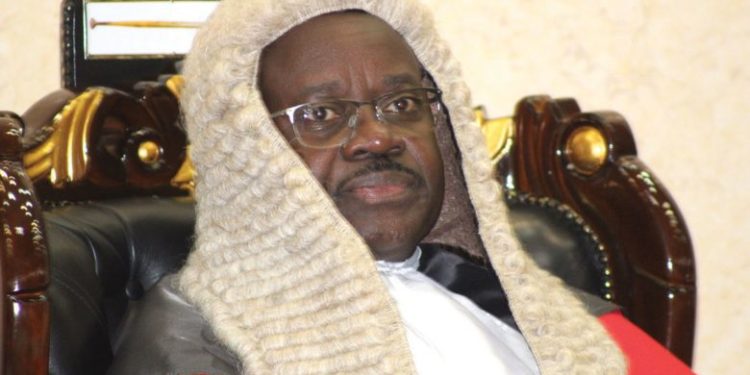At the stroke of a pen, seven brave men of the Supreme Court of Appeal have upheld a lower court ruling that declared that President Peter Mutharika was not duly elected, re-affirmed new definition of majority vote; thereby dropping a bombshell that changes the political landscape of Malawi.
It is probably the single most important ruling for the past 26 years that changes the way Malawi is going to be governed, with far reaching consequences in the political direction that the country will take and constitutionalism in general.
Led by Chief Justice Andrew Nyirenda, the Supreme Court of Appeal judges, namely Justice Edward Twea, Frank Kapanda, Justice Anthony Kamanga, Justice Rezine Nzikamanda, Justice Anaclet Chipeta and Justice Lovemore Chikopa yesterday upheld entirely the Constitutional Court judgement which a panel of five judges delivered on February 3, 2020 on the Presidential Election Case; a decision that has certified electoral processes currently underway ahead of the July 2, 2020.
President Peter Mutharika and Malawi Electoral Commission (Mec) were against enforcement of the Constitutional Court judgement, which said the incumbent President was not duly elected in the nullified May 21, 2019 presidential poll.
The seven member judges panel further ordered that only candidates who were eligible to contest in the nullified election can contest in the July 2 Presidential Election.
They further ordered that Mec should also use the same voters roll that was used during May 21, 2019 general elections.
“We direct that only the parties whose rights were injured by the conduct of the commission should participate in the fresh election. The commission must use the voters register that was used in that election. New entrants on the voters’ roll must not take part in the election. Further only presidential candidates who competed in the previous election are eligible to compete in coming election,” read the judgement.
State Vice president and UTM leader Saulos Chilima was one of the contestants in the immediate past election but has turned out to be a runningmate of Malawi Congress Party President Lazarus Chakwera, who came together with other parties under Tonse Alliance.
In his brief reaction after the ruling, Chilima said their candidature as presented on Wednesday remains unless guided otherwise by the commission.
“We will continue as we presented our papers two days ago. Should there be need that we review our positions then we will be guided by the commission after they too have made sense out of the judgment. But its straight forward,” Chilima said.
Speaking after the delivery of the judgment, Chakwera said the dismissal of the appeal is an indication of what justice should be.
He further said the outcome of the appeal must entice the commissioners of Mec to voluntarily step down from the commission.
“It’s not even just a question of demanding if they have any sense of integrity at all unless they are living in denial what the Supreme Court has said now has to make them to put down their tools today,” he said.
One of Chilima’s lawyers, Chikosa Silungwe clarified that a candidate in the election is an individual and not a pair.
“A pair has never been a candidate but the individual in an election is the candidate so the candidates in the May 21, 2019 annulled poll we know who they are. The court has simply said about eligibility. So those who remain eligible can exercise that eligibility,” he said.
Dean of faculty of law at Chancellor College Sunduzwayo Madise is of the view that no change will be effected on the position of running mate.
“My view could be there is nothing wrong in them changing their running mates because they are the candidates but we will have to see how it goes. The court is not clear on that issue but the word it used is candidate not nomination. Whether the presidential candidate can be allowed to change candidate or not may depend on how the Mec and candidate take it on,” he said.
The delivery of the judgement took over six hours and was read by justices Chikopa, Mzikamanda, and Kapanda.
Justice Kapanda, who read out the last part of the judgement, agreed with the lower court that the petitioner’s complaints alleging undue return and undue election of first appellant on May 21, 2019 was made out both qualitatively and quantitatively.
“We find that the numerous irregularities, the use of Tippex, among many, seriously undermined the credibility, integrity and fairness of the presidency during an election. They also undermined the duty placed on the commission and further grossly violated the rights of the voters to elect a leader of their choice,” he said.
The court said the conduct of Mec in management of elections in the previous elections, which resulted in gross violation of constitution provisions, demonstrated serious incompetence and negligence of duty on the part of the commission.
“Going through the record of Appeal we are concerned by the lack of seriousness towards duty on the part of electoral commissioners, the level of lack of seriousness and competence on the part of commissioners poses a serious danger to the conduct of election and institution of democracy in the country. We find that the grounds of appeal have not been made out,” he said.
On the possibility of Mec to appeal on constitutional matters, the court said it was difficult to comprehend how the commission could appeal, arguing that the scheme of the law, Mec takes a position of a referee in an election and would continue to play the role even in the proceedings in court.
The court also observed that in an event of undue return, a fresh election should have been conducted in shortest period of 60 days as provided for in the law but proceeded to upheld the previous 150 days as ordered by the court describing it as a discretion of the constitution court.
The court also upheld the interpretation of majority as 50 plus 1%, saying it was also proper for Parliament to ensure that necessary legislative provisions to ensure orderly of the election and better management of future elections.
“In view of the 50+ 1 majority rule the legislature should put in place necessary legislation that will ensure smooth implementation of constitution implementation,” reads part of the judgement.
At the onset of the delivery of judgement, Chief Justice Nyirenda described the notice of appeal brought before the panel as baseless, unprofessional and also embarrassing.
“Some of them were extremely confrontational and made unwarranted, baseless allegations of bias against the court. Allegations of bias should not be likely made especially against the court. We emphasise. Some of the grounds were not just fictitious but clearly unprofessional and distasteful we struggled to make sense out of the grounds in Mec’s appeal, we found them to be unnecessarily numerous and embarrassing,” Nyirenda said.
The court faulted the involvement of Attorney General (AG) Kalekeni Kaphale as a counsel for Mec, but said being principal legal advisor of the government the AG should have helped the court while protecting the Constitution.
Mzikamanda also said the commission erred by delegating its judicial powers in handling election complaints, stressing that only administrative powers can be delegated.
Mutharika’s Presidential Press Secretary Mgeme Kalilani said the President and his legal team will analyse the judgment and make his stand known at an appropriate time.









